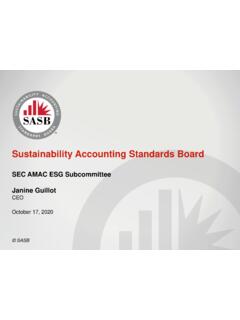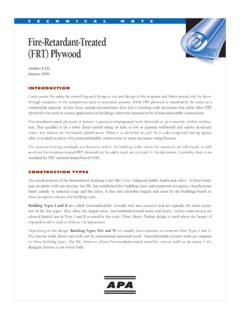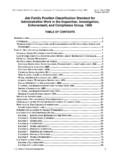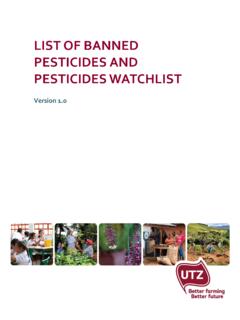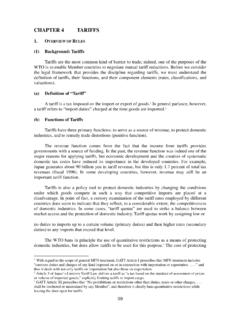Transcription of National Motor Freight Classification Procedures
1 2019 National Motor Freight Traffic Association, Inc. National Motor Freight Classification Procedures Effective July 8, 2019 1001 North Fairfax Street, Suite 600, Alexandria, Virginia 22314 2019 National Motor Freight Traffic Association, Inc. PREAMBLE PURPOSE AND SCOPE These Procedures ( Procedures ) pertain to the investigation, initiation, consideration and handling of matters related to maintenance of the National Motor Freight Classification (NMFC). The NMFC is a voluntary standard for the Classification of commodities moving in commerce, including associated rules and packaging definitions, specifications and requirements. It contains no rates or charges for transportation services nor does it suggest rates or charges.
2 These Procedures describe the organization and responsibilities of the commodity Classification standards Board (CCSB). PART I commodity Classification standards BOARD ORGANIZATION AND RESPONSIBILITIES Section 1. Organization a) The CCSB is an autonomous board of not less than three (3) and not more than eight (8) members, composed of full-time employees of the National Motor Freight Traffic Association, Inc. (NMFTA), and such other persons as may be deemed necessary to conduct the affairs of the CCSB. One member of the CCSB shall be the Chairman, and another shall be the Vice Chairman. b) The Chairman of the CCSB shall be appointed by the Executive Director of NMFTA. c) The Vice Chairman of the CCSB shall be appointed by the Executive Director of NMFTA in consultation with the Chairman of the CCSB.
3 D) The other members of the CCSB shall be appointed by the Executive Director of NMFTA in consultation with the Chairman and Vice Chairman of the CCSB. e) In the absence, or at the direction, of the Chairman of the CCSB, the Vice Chairman of the CCSB will assume the responsibilities of the Chairman. Section 2. Responsibilities The CCSB shall be responsible for: a) investigating, initiating, considering and acting on matters affecting the provisions of the NMFC, including: proposals for amending the Classification of commodities; commodity descriptions; classes; rules; packaging definitions, specifications and requirements; and any other Classification -related provisions contained in the NMFC; b) directing and monitoring NMFTA staff in its performance of analytical and support services relating to the NMFC; c) reviewing and revising these Procedures as necessary; d) reviewing and revising the CCSB s Policies and Guidelines as necessary.
4 And e) directing the publication of the NMFC as well as supplements to the NMFC. 2 2019 National Motor Freight Traffic Association, Inc. PART II RULES OF PROCEDURE FOR AMENDING THE PROVISIONS OF THE National Motor Freight Classification Rule 1. Proposal Forms The CCSB shall provide without charge a suitable form(s) for the submission of proposals for amending the provisions of the NMFC. Rule 2. Proposals a) Proposals for amending the NMFC may be filed by any person, firm, corporation or group having an interest in the Classification -related contents of the NMFC, including the CCSB itself. b) Proposals for amending the NMFC shall be submitted in writing to the Chairman of the CCSB. c) Upon request and without charge, the CCSB shall assist anyone wishing to file a proposal in preparing such proposal.
5 D) Each proposal shall be docketed, and the Chairman of the CCSB shall place proposals on the first available docket for public hearing. Rule 3. Docket Bulletins and Individual Notice a) Not less than thirty (30) days prior to a public meeting of the CCSB, the CCSB shall: 1. issue a Docket Bulletin describing the proposals that will be considered at that meeting; and 2. post the Docket Bulletin on the NMFTA s website, b) The Docket Bulletin shall: 1. specify the time, date and place of the meeting and corresponding deadlines for participating in the Classification process; 2. contain the full text of each proposal along with the relevant CCSB report (analysis), including the identity of the proponent, the identity of the CCSB contact(s) assigned to the proposal and how to reach the CCSB contact(s); and 3.
6 Specify how to obtain the data and other information in the CCSB s public docket file. 3 2019 National Motor Freight Traffic Association, Inc. c) The CCSB shall contemporaneously mail or email individual notice to: 1. proponents of the proposals that will be considered at the meeting (other than the CCSB itself); 2. shippers as reasonably can be identified by the CCSB as having a direct interest in a proposal on the docket; and 3. trade associations that have been identified as representing shippers having such interest. d) Individual notice shall: 1. specify the time, date and place of the meeting; 2. provide NMFTA s website address for online access to the Docket Bulletin; 3. provide instructions for obtaining access to the CCSB s public docket file; and 4.
7 Specify the corresponding deadlines for participating in the Classification process. Rule 4. Interested Persons and Parties of Record a) Interested Persons: Any person having an interest in a docketed proposal can communicate that interest in writing by mail, email or facsimile to the Chairman of the CCSB prior to the public meeting at which the proposal will be considered, or by attending the public meeting at which the proposal will be considered. Interested persons will be notified by mail, email or facsimile of the action taken on the docketed proposal by the CCSB at the public meeting. b) Parties of Record: A person may become a party of record to a docketed proposal by, at least seven (7) business days prior to the public meeting at which the proposal will be considered: 1.
8 Communicating its intention to so participate in writing by mail, email or facsimile to the Chairman of the CCSB; and 2. submitting pertinent information and/or data related to the transportation characteristics (density, handling, stowability and liability) of the involved articles, or relevant to packaging materials or methods in connection with proposed packaging amendments. The proponent(s) of a proposal will be included as a party of record to that proposal. Only parties of record will have the right to seek reconsideration. 4 2019 National Motor Freight Traffic Association, Inc. Rule 5. Public Docket Files a) The public docket files consist of reports, analyses, studies, supporting data and other information received by the CCSB not later than seven (7) business days prior to the public meeting at which the respective proposals will be considered.
9 The public docket files will not name the entity that provided the data. b) The CCSB will post the public docket files for all current proposals on NMFTA s website, organized by docket and subject numbers. c) Any person who does not have Internet access may obtain the CCSB s public docket file on a current proposal by submitting a request in writing by mail or facsimile to the CCSB. A reasonable charge will be assessed for copying and transmitting the document(s) requested. Rule 6. Public Meetings and Conduct of Business a) Meetings open to the public shall be conducted by the CCSB on all docketed proposals. Such meetings shall be held at least three (3) times per year. b) The CCSB may also hold special meetings to consider and vote on docketed proposals, as deemed necessary and appropriate by the Chairman of the CCSB.
10 Such special meetings shall be open to the public and shall be subject to the same notification and procedural requirements herein. c) At all public meetings the presence of not less than 60% of the membership of the CCSB shall be necessary to transact business. Meetings shall be governed by Robert s Rules of Order. d) Any person may participate at public meetings by presenting views orally and/or in writing on any proposal under consideration; however, only written statements and written presentations received by the time the record closes will be incorporated into the public docket file. The Chairman of the CCSB shall schedule a reasonable amount of time for an appearance before the CCSB.


